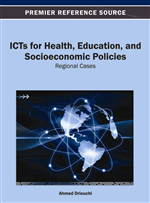 FEMISE is pleased to announce the publication of a new Volume in its series of “FEMISE Edited Volumes” entitled: ICTs for Health, Education and Socioeconomic Policies: Regional Cases. The Volume is edited by: Dr. Ahmed Driouchi, professor of Applied Economics at Al Akhawayn University and Dean of the Institute of Economic Analysis & Prospective Studies. The volume is published by IGI Global publisher and contains a number of FEMISE financed papers.
FEMISE is pleased to announce the publication of a new Volume in its series of “FEMISE Edited Volumes” entitled: ICTs for Health, Education and Socioeconomic Policies: Regional Cases. The Volume is edited by: Dr. Ahmed Driouchi, professor of Applied Economics at Al Akhawayn University and Dean of the Institute of Economic Analysis & Prospective Studies. The volume is published by IGI Global publisher and contains a number of FEMISE financed papers.
ICTs for Health, Education and Socioeconomic Policies: Regional Cases discusses the benefits that can be gained from the interactions between health, education, and socioeconomic areas. Providing a regional focus on the Southern Mediterranean, Middle Eastern, and Arab economies, this book is essential for researchers, scholars, developers, policy makers, and graduate students interested in these specific regions and studies.
Table of contents
Need of a Balance between Fragmented and Coordinated Decision-Making (pages 1-24)
Insights to the Interconnections of Health, Education, and Other Wealth Components(pages 25-47)
Theoretical Model and Foundations for Assessing Interactions of Health, Education, and Economic Outcomes (pages 48-70)
Descriptive Statistics, Regression Analysis, and Tests of Hypotheses of Interdependencies of Health, Education, and Economic Outcomes (pages 71-102)
ICTs and Socioeconomic Performance with Focus on ICTs and Health (pages 104-125)
ICTs, Youth, Education, Health, and Prospects of Further Coordination (pages 126-145)
Women Empowerment and ICTs in Developing Economies (pages 146-164)
ICTs and Coordination for Poverty Alleviation (pages 165-189)
The Triple Helix as a Model for Coordination with Potential for ICTs (pages 191-210)
Socioeconomic Reforms, Human Development, and the Millennium Development Goals with ICTs for Coordination (pages 211-229)
Social Deficits, Social Cohesion, and Prospects from ICTs (pages 230-251)
Risk Factors, Health, Education, and Poverty: Can ICTs Help1? (pages 252-277)
Implications of the Findings and Prospects for Further Coordination (pages 278-296)
To order this book please follow this link


